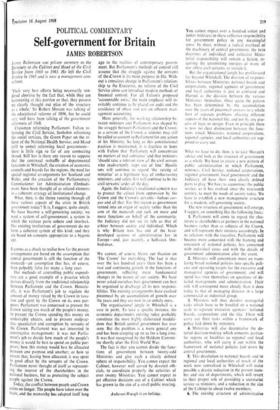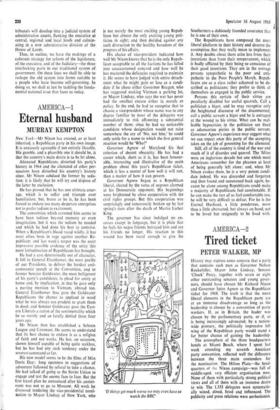Self-government for Britain
POLITICAL COMMENTARY JAMES ROBERTSON
lames Robertson was private secretary to the Secretary to the Cabinet and Head of the Civil Service from 1960 to 1963. He left the Civil Service in 1965 and is now a management con- sultant.
`Their very best efforts being necessarily ren- dered abortive by the fact that, while they are hammering at this portion or that, they possess no clearly thought out plan of the structure as a whole.' Sir Robert Morant was talking of the educational reforms of 1898, but he could very well have been talking of the government reformers of 1968.
Crossman reforming Parliament, Fulton re- forming the Civil Service, Seebohm reforming the social services, the Green Paper on the re- form of the National Health Service, and Maud (still to come) reforming local government— there is little sign so far of any connecting thread. Still less is there any reason to suppose that the continual reshuffle of departmental functions in Whitehall, the creation of economic councils and boards for the regions, the need for special regional arrangements for Scotland and Wales, and the creation of the Parliamentary Commissioner for Administration (Ombuds- man), have been thought of as related elements in a coherent strategy of institutional change.
What, then, is the theme running through all these various aspects of the crisis in British government today? It is, I suggest, quite simple. We have become a self-governing society; we need a system of self-government, a system in which the various parts cohere and interlock. Our existing institutions of government do not form a coherent system of this kind; and they are based on concepts appropriate to a bygone age.
It comes as a shock to realise how far the present arrangements are based on the assumption that central government is still the function of the monarch—an assumption that has, of course, been palpably false for many a long year.
Our methods of controlling public expendi- ture are a good example of a practice which derives directly from the traditional relationship between Parliament and the Crown. Historic- ally, it was Parliament's job to regulate the amount of money raised by the Crown in taxa- tion and spent by the Crown on its own pur- poses. Parliament was concerned to prevent the Crown taking too much of the people's money, to prevent the Crown spending this money on undesirable objects, and to prevent malprac- tice, speculation and corruption by servants of the Crown. Parliament was not interested in constructive management: it was not Parlia- ment's job to decide how much of the people's money it would be best to spend on public pur- poses; how this money would best be allocated between one purpose and another; or how to ensure that, having been allocated, it was spent to good effect by the servants of the Crown. Parliament never thought of itself as represent- ing the interest of the shareholders in the national business, but as protecting the subject people against the Crown.
Today, the conflict between people and Crown exists no longer. The people have taken over the State, and.the monarchy has adapted itself long ago to the realities of contemporary govern- ment. But Parliament's methods of control still assume that the struggle against the servants of the.Crown is its main purpose in life. With- out a conscious change in Parliament's relation- ship to the Executive, no reform of the Civil Service alone can introduce modern methods of financial control. For all Fulton's proposed `accountable units,' the main emphasis will in- evitably continue to be placed on audit and the avoidance of abuse and not on efficient man- agement accounting.
More generally, the working relationship be- tween ministers and Parliament was shaped by the struggle between Parliament and the Crown: as a servant of the Crown, a minister may still be called to account to Parliament for any action of his Ministry. So long as this constitutional position is maintained, it is fruitless to hope with Fulton that 'Parliament will concentrate on matters of real substance' and that ministers `should take a tolerant view of the civil servant who inadvertently steps out of line.' Hostile rtes will continue to regard 'the raising of minutiae' as a legitimate way of embarrassing ministers, and safety first will continue to be the civil servants' order of the day.
Again, the Judiciary's traditional concern was to protect the citizen from oppression by the Crown and the Crown's servants—habeas cor- pus and all that. For this reason as government turned into an organ of society rather than the arm of the monarch and took on more and more functions on behalf of the community. the Judiciary did not see its role as that of arbiter between society and individual. Which is why Britain now has one of the least- developed systems of administrative law in Europe—and, just recently, a half-cock Om- budsman.
We cannot, of course, blame our fixation on `The Crown' for everything. The fact is that over the last hundred years there has been a vast and continuing growth in the functions of government, reflecting more fundamental changes in the nature of our society. We have never asked ourselves how government can best be organised to discharge all its new responsi- bilities. The existing arrangements have evolved piecemeal by an accumulation of growth over the years and they are now in an unholy mess. The organisational jungle in Whitehall is a case in point. To take a specific instance, the economic departments existing today probably constitute the most highly elaborated muddle- dom that British central government has ever seen. But the problem is a more general one and has been creeping up on us for a long time.
It was first recognised by the Haldane Commit- tee shortly after the First World War.
The fact is that you cannot divide the func- tions of government between twenty-odd Ministries and give each a clearly defined sphere of responsibility. You cannot expect the Cabinet, however well served by devoted offi- cials, to coordinate properly the activities of over twenty Ministries. You cannot expect to get effective decisions out of a Cabinet which has grown to the size of a small public meeting.
Auberon Waugh is on holiday. You cannot expect over a hundred senior and junior ministers to share collective responsibility
for government policy in any meaningful
sense. In short, without a radical overhaul of the machinery of central government, the twin doctrines of individual and collective Minis- terial responsibility will remain a fiction, re- quiring the unremitting energies of many of our ablest civil servants to sustain it.
But the organisational jungle has proliferated far beyond Whitehall, The division of responsi- bilities between Ministries, national boards and corporations, regional agencies of government and local authorities is just as confused and blurred as the division between the various Ministries themselves. Once again the pattern has been determined by the accumulation over the years of piecemeal answers to a whole host of separate problems affecting different aspects of the national life, and not by any pro- cess of logic or design. Even in principle there is now no clear distinction between the func- tions which Ministries, national corporations, regional agencies, and local authorities are sup- posed to carry out.
What we have to do. then, is to take Morant's advice and look at the structure of government as a whole. We have to create a new pattern of public administration in which Parliament. ministers, Civil Service, national corporations,
regional government, local government and the Judiciary all have their own clearly defined parts to play. We have to reconstruct the public service, as it has evolved since the nineteenth century, to meet the needs of society today. We have to establish a new management structure for a modern, self-governing society.
The new structure of government will emerge, I suggest, on something like the following lines:
1. Parliament will come to regard the elec- torate as shareholders or partners in the national
business rather than as subjects of the Crown,
and will represent their interests accordingly. In its relations with the executive, Parliament will - become more concerned with the framing and execution of national policies, less concerned with individual cases and with the details of government administration after the event.
2. Ministers will concentrate more on trans- lating broad national policies into specific poli- cies and operating targets for the executive and managerial agencies of government, and will spend less time themselves on questions of do- tailed management and administration. Their role will correspond more closely than it does today to that of managing director in a large commercial or industrial group.
3. Ministers will thus devolve managerial tasks which have to be handled on a national
scale to separate executive agencies--national boards, corporations and the like. These will carry out their tasks within a framework of policy laid down by ministers.
4. Ministries will also decentralise the de- tailed decision-making which concerns particu- lar regions or localities to regional and local authorities, who will carry it out within the framework of national policies laid down by central government.
5. This devolution to national boards and to regional and local authorities of much of the work now centralised in Whitehall will make possible a drastic reduction in the present num- ber and size of departments, which will revert to their proper role of providing a secretariat service to ministers, and a reduction in the size of the Cabinet to about twelve members.
6. The existing structure of administrative
tribunals will develop into a judicial system of administrative courts, flanking the executive at central, regional and local levels and culmin- ating in a new administrative division of the House of Lords.
Thus, in outline, we have the makings of a coherent strategy for reform of the legislature, of the executive, and of the Judiciary—the three interlocking parts in our traditional system of government. On these lines we shall be able to reshape the old system into forms suitable to a people who have become self-governing. In doing so, we shall at last be tackling the funda- mental national issue that faces us today.



































 Previous page
Previous page